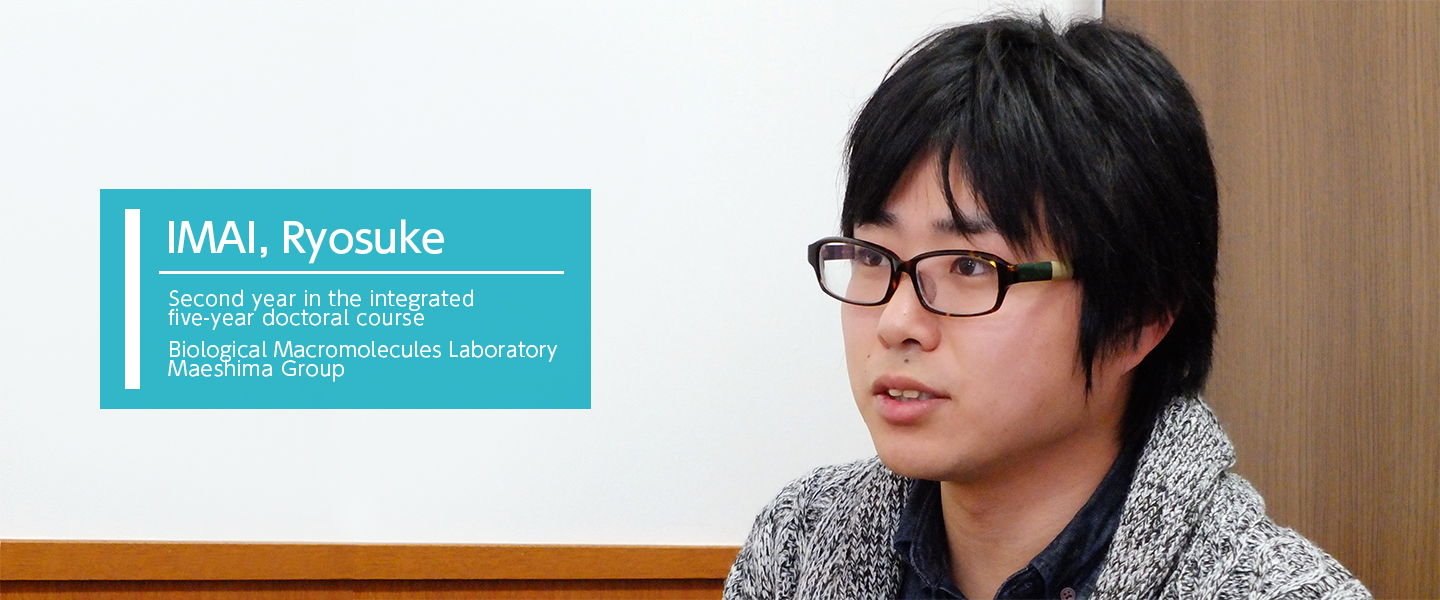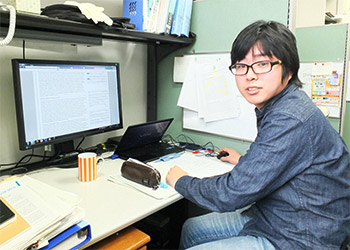Biological Macromolecules Laboratory, Maeshima Group IMAI, Ryosuke

- Please tell us about your research.
- When medicines such as anticancer drugs are delivered to cells, they enter the nucleus and damage the DNA. I would like to identify how the mobility of DNA changes upon such treatments. By using a specially designed microscope, I am trying to directly observe the movement of fluorescently-labeled proteins (histones) around which DNA is wrapped.
- Why did you choose the Maeshima Group?
 When I was an undergraduate student I came across a news article introducing a research, and thought that it would be a fascinating topic for me to work on. At that time I didn’t know whose research it was. When I joined the NIG tour, however, I happened to meet Prof. Maeshima, and found out that he was the very person who conducted that research! I thought “Wow! I am now at the place where that work was done!” Talking with him in front of his poster, I was so impressed by his research that without looking around other labs I just made the decision with my intuition.
When I was an undergraduate student I came across a news article introducing a research, and thought that it would be a fascinating topic for me to work on. At that time I didn’t know whose research it was. When I joined the NIG tour, however, I happened to meet Prof. Maeshima, and found out that he was the very person who conducted that research! I thought “Wow! I am now at the place where that work was done!” Talking with him in front of his poster, I was so impressed by his research that without looking around other labs I just made the decision with my intuition.
To tell the truth, before joining the NIG tour, I was thinking about staying in my university for graduate school and thereafter getting a job in the private sector. However, when I joined the NIG tour, academic research career looked extremely attractive! Although choosing this career path may make it difficult to get a company job, research life looked interesting enough for me to give it a try.- How did you learn about NIG?
- An acquaintance of mine told me that there is a research institute in Shizuoka that provides graduate education. The day I looked at the website of NIG was the closing date for application of the NIG tour, so I applied on the spot. Since then everything went on swimmingly. It was a last-minute application, and the professor whose article I am interested in was working at the institute - it might be linked by fate!
- How was the NIG’s bus tour for prospective students?
- Many students asked rather direct questions to graduate students who guided the tour. For example, I asked what their TOEIC scores are like. Such questions are difficult to ask in front of many people but could be asked on the bus; I thought that was pretty good.
- How is your student life?
- There are not many students at NIG. Because of the small size of the student pool, I know not only my classmates but also most of the senior students and professors. People here are so friendly and accommodating, and my seniors take good care of me. I am a member of the badminton club. This is a good opportunity to meet students, postdocs and professors from various laboratories.
- The graduate university is a part of a research institute. What do you think about that?
- Laboratories at NIG interact with each other more actively than those at my university. For example my thesis advisor Prof. Maeshima has introduced to me a professor of another laboratory, so that I could talk with him and learn experimental methods from the postdoc belonging to his laboratory.
I can tell you an impressive episode: I was doing an experiment and found that I urgently needed a reagent that we did not have in our lab. Then Prof. Maeshima simply told me “Why don’t you ask other people in the institute?” Using an institutional mailing list I sent an e-mail to all NIG members to ask for a dose of the reagent, and within 15 minutes I received e-mails from many labs offering their lab stock. I was really surprised that the boundaries between laboratories are almost non-existent.
- What would be your message to future graduate students at the NIG?
- Firstly, you should talk face-to-face with the professor you are interested in, and also with all the laboratory members if possible. Initially I had been only interested in Prof. Maeshima’s research that was introduced in the news article, but after I had a chance to talk with him, I found his research field even more interesting. That’s how I developed my desire to study here at NIG.
Secondly, you should recognize that going to graduate school has many positive aspects. Most people say going on to a doctoral course is hard, but it is no use being negative. I would advise to actively challenge various things, for example by talking to many people.
Back

 When I was an undergraduate student I came across a news article introducing a research, and thought that it would be a fascinating topic for me to work on. At that time I didn’t know whose research it was. When I joined the NIG tour, however, I happened to meet Prof. Maeshima, and found out that he was the very person who conducted that research! I thought “Wow! I am now at the place where that work was done!” Talking with him in front of his poster, I was so impressed by his research that without looking around other labs I just made the decision with my intuition.
When I was an undergraduate student I came across a news article introducing a research, and thought that it would be a fascinating topic for me to work on. At that time I didn’t know whose research it was. When I joined the NIG tour, however, I happened to meet Prof. Maeshima, and found out that he was the very person who conducted that research! I thought “Wow! I am now at the place where that work was done!” Talking with him in front of his poster, I was so impressed by his research that without looking around other labs I just made the decision with my intuition.














